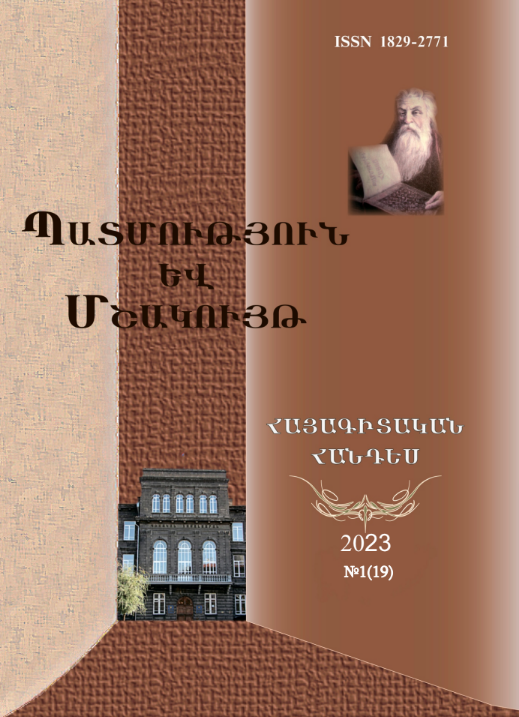Wars and Genocide
DOI:
https://doi.org/10.46991/hc.2023.19.1.043Keywords:
War, Genocide, Ottoman Empire, Armenia, First World War, Second World War, Colonial Genocide, Namibia, Shoah, War Defeat, Smyrna, Humanitarian InterventionsAbstract
The historical settlement area of the Armenians, the Armenian Highland, as well as the South Caucasus have been among the most disputed and contested areas in the world since ancient times. This has had far-reaching negative consequences for the people living in this region: Difficulties in establishing a central state or small statehood, strong dependence on competing regional hegemonic powers, foreign domination, insecurity for life and limb resulting in migration or mass exodus and even genocide.
Genocide is one of those crimes caused by wars and civil wars, but also by periods of transformation, by one-party regimes, and by the suspension of parliamentary rule. In the 20th century, serial genocides occurred, not coincidentally, during the two world wars. These wars provided the smokescreen behind which states could realize an intention of extermination usually conceived before the war began.
However, the actual military starting point for the Ottoman genocide of three million indigenous Christians was not the First World War, but the Balkan wars of 1912 and 1913, which became a test run for deportations in the Ottoman province of Edirne (Adrianoupolis), which were carried out as death marches. The Young Turk rulers learned from this occasion that people expelled across state borders returned, while a high proportion of those deported to the interior perished.
References
Angelomatis, Ch. 1963, Chronikon Megalis Tragodias. Athens, Bookshop of Estia, n.d. http://www2.fhw.gr/chronos/13/en/foreign_policy/sources/14.html
Bergmann, Martin S. 1995, Wiederkehrende Probleme in der Behandlung Überlebender und ihrer Kinder, In: Kinder der Opfer, Kinder der Täter: Psychoanalyse und Holocaust. Hg. Martin S. Bergmann, Milton E. Jucory, Judith S. Kestenberg. Frankfurt am Main: S. Fischer․
Bierstadt, Edward Hale 1924, The Great Betrayal: A Survey of the Near East Problem. New York (Bloomingdale, Il., 2008)․
Edip, Halide Adıvar: Memoirs. London 1926 (Reprint: Gorgias Press, Piscataway/NJ, 2005)
Horton, George 1926, The Blight of Asia: An Account of the Systematic Extermination of Christian Populations by Mohammedans and of the Culpability of Certain Great Powers; with the True Story of the Burning of Smyrna. Indianopolis: Bobbs-Merrill Com., http://www.hri.org/docs/Horton/HortonBook.htm
Housepian Dobkin, Marjorie 1998, Smyrna 1922. The Destruction of a City. New York: Newmark Press, p. 172f.
Kieser, Hans-Lukas: Armeniermord: Von der Lästigkeit vertuschter Geschichte. „Traverse: Zeitschrift für Geschichte“, 2002, 2, p. 131-142
Politisches Archiv des Auswärtigen Amtes (PA/AA), Der Geschäftsträger der Botschaft Konstantinopel (Radowitz) an den Reichskanzler (Bethmann Hollweg), Bericht, 4. Oktober 1916. - http://www.armenocide.net/armenocide/armgende.nsf/$$AllDocs/1916-10-04-DE-002
Schwartz, Michael: Die Balkankriege 1912/13: Kriege und Vertreibungen in Südosteuropa. „Militärgeschichte – Zeitschrift für historische Bildung“. 2008, Ausg. 2
Ureneck, Lou: Smyrna September 1922, The American Mission to Rescue Victims of the 20th Century’s First Genocide. New York: HarperCollins․ 2016
Walker, Christopher J. 1983, The Survival of a Nation. London: Croom Helm․
Zavriev, D.S. 1947, K novejšej istorii severno-vostočnych vilaetov Turcii (On the recent history of the northeastern vilayets of Turkey; Russian) Tbilisi․
Zimmerer, Jürgen: Doch kein Völkermord? Warum der Genozid an den Nama und Herero nicht für journalistische Spiele taugt. – „IPG“, 18.07.2016, https://www.ipg-journal.de/kommentar/artikel/doch-kein-voelkermord-1536/
Downloads
Published
Issue
Section
License
Copyright (c) 2023 Tessa Hofmann

This work is licensed under a Creative Commons Attribution-NonCommercial-ShareAlike 4.0 International License.

